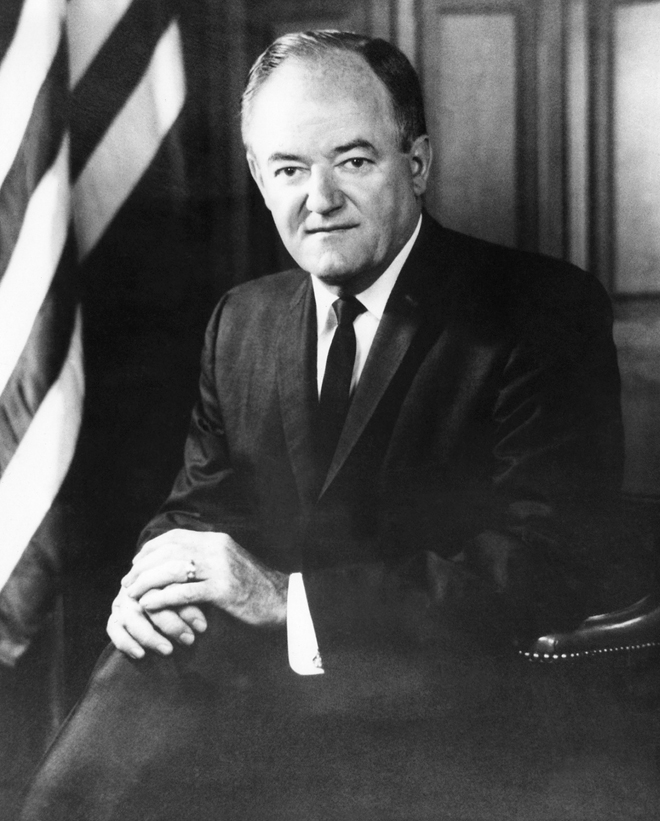Humphrey, Hubert Horatio (1911-1978), served as vice president of the United States under President Lyndon B. Johnson, and was the Democratic presidential nominee in 1968. Humphrey lost to former Vice President Richard M. Nixon. Before his election as vice president in 1964, Humphrey had been elected to the U.S. Senate three times. He was the first Democrat ever elected to the Senate from Minnesota. In 1970, he was again elected to the Senate, and he was reelected in 1976. In 1977, the Senate made Humphrey the deputy president pro tempore of the Senate, a new post. The title will be given to all former presidents and vice presidents who later become members of the Senate.

Early life.
Humphrey was born on May 27, 1911, in Wallace, South Dakota. He graduated from the Denver College of Pharmacy in 1933, and worked for four years in his father’s drugstore. He later returned to college, and graduated from the University of Minnesota in 1939. Humphrey earned a master’s degree at Louisiana State University. He then worked for the federal Work Projects Administration, and for the War Manpower Commission in Minneapolis. He also taught political science at Macalester College in St. Paul, Minnesota.
In 1936, Humphrey married Muriel Fay Buck of Huron, South Dakota. The Humphreys had four children—from oldest to youngest, Nancy Faye, Hubert Horatio III, Robert Andrew, and Douglas Sannes.
Humphrey entered politics in 1943, when he ran unsuccessfully for mayor of Minneapolis. In 1944, he helped merge Minnesota’s Democratic and Farmer-Labor parties into the Democratic-Farmer-Labor Party. Humphrey was elected mayor of Minneapolis in 1945 and was reelected in 1947. He gained national fame at the Democratic National Convention in 1948, when he successfully led the fight for a strong party stand on civil rights.
Senator and vice president.
Humphrey was elected to the U.S. Senate in 1948, and was reelected in 1954 and 1960. In 1961, he became Senate Democratic whip (assistant leader). In the Senate, he was a leading spokesman for arms control, civil rights, medical aid to the needy, and aid to education. Humphrey suggested creation of the federal Food for Peace program, which makes U.S. farm products available to poor countries and needy people. He was also the first to prominently promote the establishment of a peace corps, an overseas volunteer work program. Humphrey campaigned for the presidential nomination in 1960, but withdrew after losing two primary elections to Senator John F. Kennedy of Massachusetts.
In the 1964 presidential election, President Johnson and Humphrey defeated their Republican opponents, Senator Barry M. Goldwater of Arizona and Representative William E. Miller of New York. Humphrey became one of the busiest vice presidents in United States history, serving as chairman of several government councils.
Presidential candidate.
In 1968, the Democratic National Convention nominated Humphrey for president. He and his running mate, Senator Edmund S. Muskie of Maine, lost to their Republican opponents, Nixon and Governor Spiro T. Agnew of Maryland. Humphrey campaigned for, but did not win, the 1972 Democratic presidential nomination. He died on Jan. 13, 1978. His widow, Muriel, filled the Senate vacancy created by his death, serving from Jan. 25 to Nov. 7, 1978.
